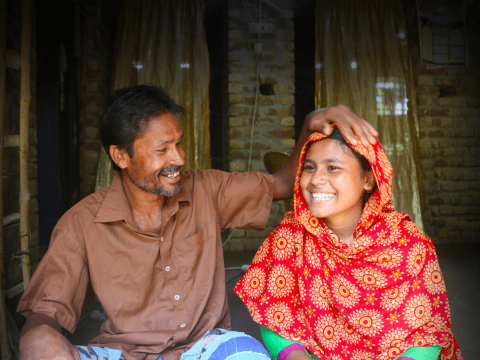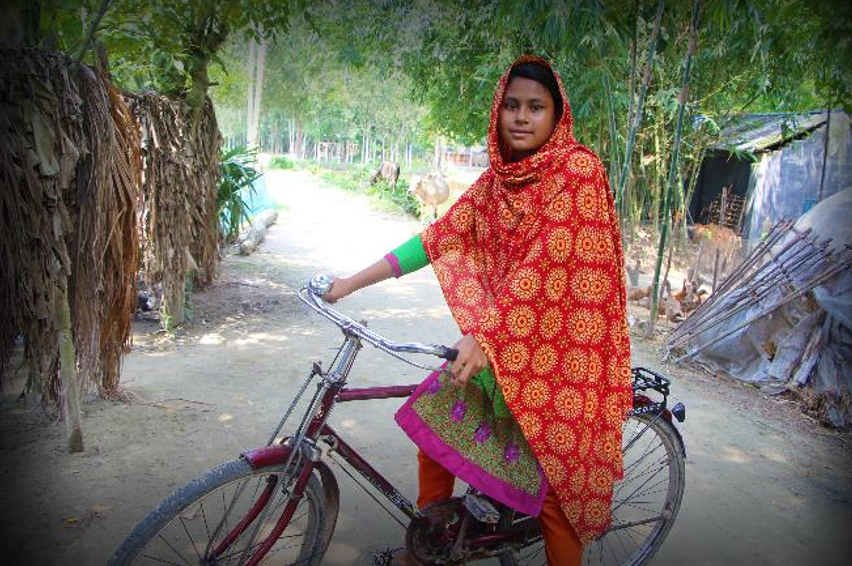USAID and World Vision support an equal future inspired by adolescent girls

Sumaiya (14) is a high school student in Kaliganj in southwest Bangladesh. Riding a cycle to school every morning, Sumaiya is confident and respected by her friends and neighbors – who consider her an all-rounder! Excelling at school, leading a youth group (with six other girls) to advocate against child marriage and (during the pandemic), encouraging families to wash hands, wear masks and practice physical distancing – Sumaiya has a busy life.
Sumaiya appreciates her parents Jaharul and Muslima for their unwavering support. “My parents have given me every opportunity and inspired me to do my best. My father is my biggest champion – he always encourages me to study and keep busy with school and activities I am passionate about.”
The U.N. children’s agency, UNICEF, estimates more than 650 million women alive today were married before the age of 18. Even in countries where there are laws to prevent child marriage — like Bangladesh — the practice can be deeply rooted in culture and largely accepted in society. Laws are not consistently enforced, and children are often allowed to marry as long as there is parental consent, regardless of their age.
But the practice is devastating: Early marriage can significantly impact a girl’s ability to continue with her education. Many girls are forced to drop out in order to focus on domestic responsibilities or to raise children of her own. But as children themselves, they are not physically and emotionally prepared to become mothers. Teen moms and their babies are both at a higher risk of dying in childbirth.
And while poverty is often a key factor that leads to child marriage, it’s also an ongoing consequence. Without an education, child brides are unable to end the cycle of poverty for themselves or their family.

These are all things that Jaharul and Muslima (Sumaiya’s parents) learned as participants of a male engagement for gender equality session – put on by USAID’s Nobo Jatra project, led by World Vision Bangladesh. During the sessions, 12 couples meet with a facilitator every 15 days. The goal is to improve immediate household relationships, as well as to reduce gender-based violence and child marriage rates. To date, 9,814 couples (husbands and wives) have participated in male engagement sessions.
Jaharul feels that his attitude towards his daughters has completely changed after he and Muslima attended the male engagement sessions. “My dream is for Sumaiya to become a doctor one day. When Sumaiya tells us that she wants to be independent and provide for the family, I feel proud and blessed to have a daughter. I work doubly as hard so that I can invest in my children’s education – because that way I am investing in the future.”
Jaharul and Muslima value spending time with their daughters (the couple also have a younger daughter Achia aged 4), making sure to have meals together and helping one another with household chores. The couple have also become catalysts in their village – discouraging early marriage and imparting what they’ve learned to their children.
Despite schools being shut during the COVID crisis, Sumaiya has continued to study every single day and also helps her little sister Achia to learn and write the alphabet. Muslima is equally determined for her children to have a strong education. “Once schools reopen, both Sumaiya and Achia will resume attending. No matter what – we will make sure our daughters go to school and grow up as valued individuals.”
Nobo Jatra works in many different ways to change attitudes and traditional norms that can restrict gender equality. In addition to male engagement, the project also supports pregnant and lactating women with cash transfers so that families can eat nutritious, healthy meals. When Muslima was pregnant with Achia, the family received monthly cash transfers of $26 every month for 15 months. The cash was transferred directly to Muslima’s e wallet linked to her mobile phone – and Muslima and Jaharul jointly decided what food to buy at local markets. Facilitators also visited the family every month to explain the benefits of eating healthy, balanced meals, visiting the local clinic for healthcare and balancing household and childcare tasks. Muslima says, “I also attended courtyard sessions and learned many things, like the importance of breastfeeding and how to cook nutritious meals for the family using rice, lentils and vegetables.”
When Nobo Jatra first started implementing in 2015, only 8 percent of men thought that they should share household and childcare tasks. Today, over 92% of men say that husbands and wives should work together on household chores and caregiving for children. Over 89% of men also think that husbands and wives should consult on household budgeting and jointly agree on how to spend the money. These changes trickle down to the lives of adolescents like Sumaiya – who can attend school, aim for higher education opportunities and lead a life that is free from gender based violence.
Nobo Jatra, which translates to “new beginning,” has helped Sumaiya’s family, as well as other families in southwest Bangladesh, lead healthy and reimagine a better, more equal world.